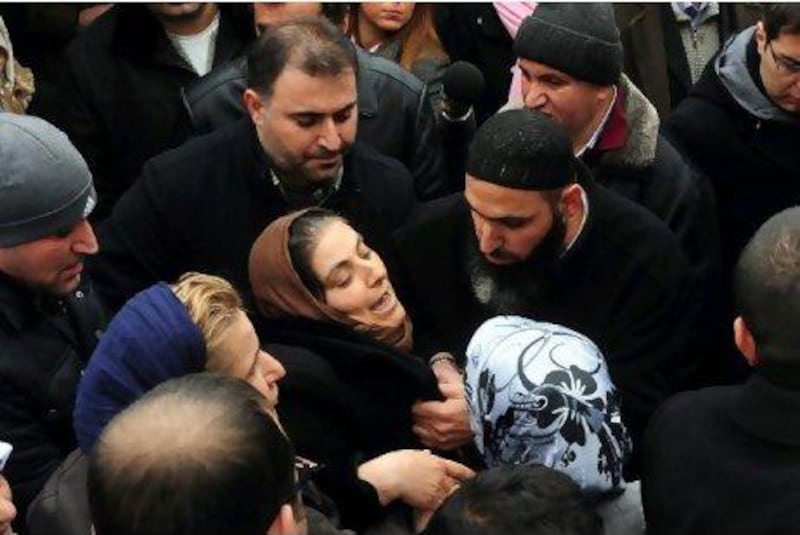ISTANBUL // The admission by a member of the Armenian Christian minority in Turkey that he killed his sister and her Muslim husband after a row about inter-religious marriage has triggered fears of a worsening "climate of hate" in the country.
"Of course it will influence the situation of Christians and other minorities," Levent Sensever, a writer and member of a non-governmental organisation campaigning for stronger laws against hate crimes, said about the double murder in an interview lask week. "It contributes to a climate of hate."
The death of Soney Vural, 26, and her husband Zekeriya Vural, 29, who were both found with gunshot wounds to the head in Istanbul on December 12, has gripped the city. Police have arrested Gonay Ogmen, 29, the brother of Soney, as the suspected killer. Mr Ogmen has admitted to killing the couple, Levent Mercan, a lawyer representing the Ogmen family, said in an interview.
Knowing that her family objected to her marrying a Muslim, Soney Vural wed her husband three weeks ago in a civil ceremony that she kept secret from her relatives, who were reportedly furious when they found out about it. On December 11, Mr Ogmen met with the couple in a restaurant to talk things over; images of the three were captured by the restaurant's security cameras.
In the meeting, Zekeriya Vural rejected Mr Ogmen's demand for a church wedding to make the bond more palatable for Soney's family. The three argued about this issue in the restaurant and later in the couple's parked car. Mr Ogmen, who had brought a gun to the meeting and was sitting on the back seat, told police he felt insulted by Mr Vural and shot him in the head. He then shot his sister.
"He acted because of that row with his brother-in-law. It was a personal thing," said Mr Mercan, the lawyer. He emphatically denied the motive had been religious. But Turkish media reports suggested that religion played a major part in the crime. "Church wedding or death", the Vatan newspaper said in a headline.
In recent years, several members of Turkey's tiny Christian minority, numbering about 100,000 people in a country of 70 million, have been killed by radical nationalists who regarded the Christians as a threat to Turkey's national unity.
In the most notorious case, a nationalist teenager shot Hrant Dink, a prominent Armenian-Turkish journalist, in 2007 because Mr Dink campaigned for the recognition of the Armenian genocide. Also in 2007, nationalists killed three evangelical missionaries, among them a German priest. The Ogmen case is the first time the killing of a Muslim by a Christian for perceived religious reasons has come to light in recent years.
Mr Sensever, a leading member of the Association for Social Change and Campaign to Stop Hate and Nationalism, said the attention the media gave to the suspected killer's religion carried the risk of making similar crimes against Christians by Muslims appear less severe.
"Without expressing it openly, they are saying 'Look, the Christians are doing it as well'," Mr Sensever said. He added that the way Turkish media reported the case made the Christian minority appear like a group governed by archaic ideas of honour and tradition. "That is creating problems for all Christians" in Turkey, he said.
Newspapers quoted members of Zekeriya Vural's family as saying that the double murder was an "honour killing" by the Armenian Christian family. "The mother and the father of the girl uttered threats and said: 'We will have both of them killed'," Cemil Vural, an uncle of the Muslim husband, told Hurriyet newspaper. "It was a decision of the family council."
In Turkey, the term "honour killing" is mostly used for crimes committed against women in rural areas in order to revenge a perceived insult to the honour of a family. Until 2005, Turkish laws offered lower sentences for perpetrators of "honour killings", arguing they followed a special code. That clause was scrapped in a major judicial reform inspired by the European Union, which Turkey wants to join.
Mr Mercan rejected the accusation of an "honour killing" in the Ogmen case. "There is no such tradition" of violence against inter-religious marriages in Turkey, he said. "Many Muslim men marry Christian women, and many Christian men marry Muslim women, but we have never had any problem." He also said the Ogmen family was devastated by what had happened and that Ogmen family members attended the funeral of Zekeriya Vural. In contrast, families involved in "honour killings" are often openly proud of the crime.
Like Mr Sensever, Mr Mercan said he was concerned that the murder of the Vurals could aggravate the social climate in Turkey. "I see such a danger," he said.
Mr Sensever said his group was starting a campaign to build pressure for a change to Turkey's laws. He said laws should carry heavier sentences for politically, racially or religiously motivated crimes than for crimes perpetrated for personal reasons.






